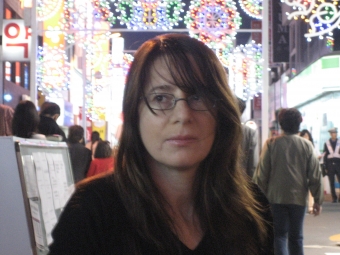YEAR: 2014
ID APARTADO: 3
APARTADO: awards_and_jury_members
SUBAPARTADO:
SECCION: new_directors_award_jury
TABLE: 1
ID: 4342
LANGUAGE: in
MAQUETACION:
TITULO:
RULE: 1
Z365" or "Festival all year round" is the new strategic point of the Festival in which converge investigation, accompaniment and development of new talents (Ikusmira Berriak, Nest); training and cinematic knowledge transfer (Elías Querejeta Zine Eskola, Zinemaldia + Plus, Filmmakers' dialogue); and investigation, disclosure and cinematic thought (Z70 project, Thought and Discussion and Research and publications).
Nicole Brenez teaches Cinema Studies at the University of Paris 3-Sorbonne Nouvelle. Graduate of the École Normale Supérieure, agrégée of Modern Litterature, she is a Senior Member of the Institut Universitaire de France. She is the author of several books and is the curator of the Cinémathèque Française's avant-garde film series.
Among her publications: De la Figure en général et du Corps en particulier. L'invention figurative au cinéma (De Boeck Université, 1998), Abel Ferrara (Illinois University Press, 2007), Traitement du Lumpenproletariat par le cinéma d'avant-garde (Séguier, 2007), Cinéma d'avant-garde Mode d'emploi (Gendaishicho-shinsha Publishers, 2012), Jean-Luc Godard théoricien des images (La Camera Verde, 2014).
Editor or co-editor of: Jeune, dure et pure. Une histoire du cinéma d'avant-garde et expérimental en France (Cinémathèque Française/Mazzotta, 2001), La Vie nouvelle/nouvelle Vision (Leo Scheer, 2004), Jean-Luc Godard: Documents (Centre Georges Pompidou, 2006), Jean Epstein. Bonjour Cinéma und andere Schriften zum Kino (FilmuseumSynemaPublikationen, 2008), Le cinéma critique. De l'argentique au numérique, voies et formes de l'objection visuelle (Publications de la Sorbonne, 2010).
She is the scientific editor or co-editor of the writings of Masao Adachi, and Jean Epstein. She has organised many film events and retrospectives, notably Jeune, dure et pure, A History of Avant-Garde Cinema in France for the French Cinémathèque in 2000 and curated series in Buenos Aires, Rio de Janeiro, New York, Tokyo, Vienna, London, Madrid, Belo Horizonte, etc.
With Philippe Grandrieux, she produces the collection It May Be That Beauty Has Strengthened Our Resolve, devoted to revolutionary filmmakers forgotten or neglected by the history of cinema.
Monday to Thursday: from 9:00 a.m. to 3:30 p.m.
Fridays: from 10:00 a.m. to 2:00 p.m.





